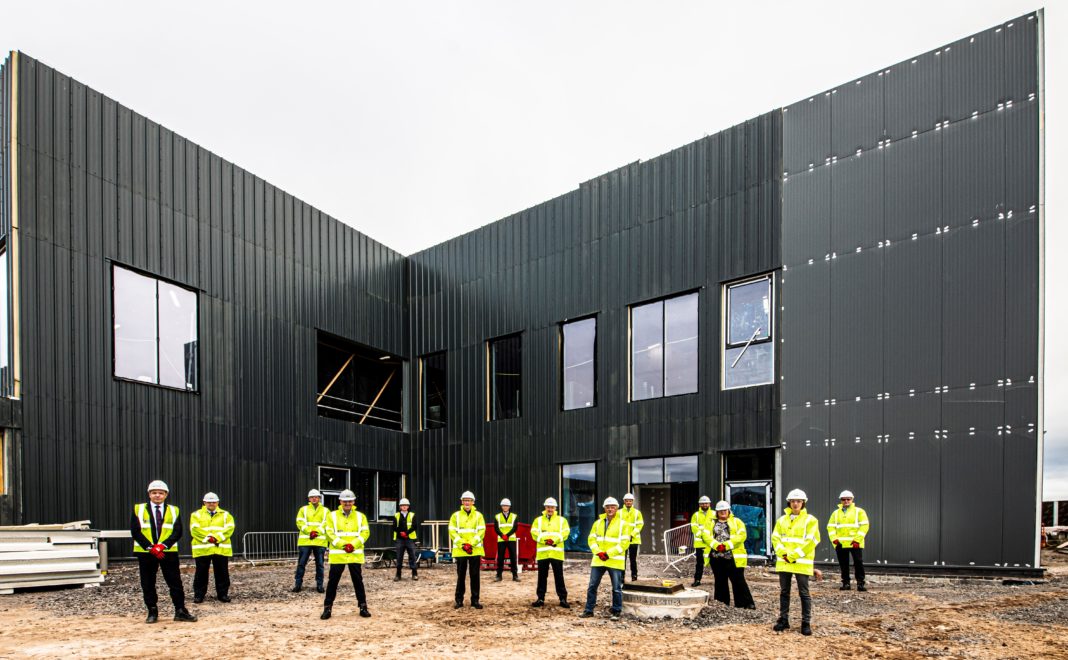
THE build of a new medicines manufacturing innovation centre will solve ‘major’ challenges in the pharmaceutical industry, the University of Strathclyde has said.
Being constructed by Tilbury Douglas, the facility at Renfrewshire’s Advanced Manufacturing Innovation District Scotland (AMIDS) is scheduled for completion in early 2022.
The £35 million Medicines Innovation Centre will develop next-generation pharmaceutical manufacturing processes, which the Glasgow-based university said will ‘drive forward’ innovation in the medicines supply chain.
The facility has been pioneered through a public-private collaboration between the technology innovation organisation, CPI; the University of Strathclyde; UK Research and Innovation; Scottish Enterprise; and founding industry partners, AstraZeneca and GSK.
Collaboration is set to be at the heart of the centre’s work, with the partners intending on working together to help boost innovation in novel medicines and the pharmaceutical supply chain, in what the university said is ‘critical’ for adapting to the changing needs of global populations and driving a healthier society.
Operating at a commercial scale, the facility will industrialise novel techniques for producing patient-centric medicines – including real-time release of drugs and integrated process analytics. The technologies will ‘transform’ manufacturing processes, support the reduction of materials used in process development, and accelerate timelines for achieving right first time and real-time release manufacturing principles.
The university said that the facility aims to become an international beacon in medicines manufacturing, driving international engagement and attracting firms that do not currently have a presence in the UK.
Following the topping out, internal fit out of the facility will be completed in early 2022, the university said. It added that, in the first five years of its operation, the centre is expected to support over 100 jobs – both technical and non-technical – and generate £200 million investment in advanced technologies.
From early 2022, companies of all sizes will be able to visit the facility and engage in discussions around accessing the transformative technology and participating in ambitious collaborative projects to develop new pharmaceutical innovations.
Cameron Stewart, regional director of Tilbury Douglas, said, “Today marks a real construction milestone for the project and our team is looking forward to handing over the centre at full completion. We are proud to work alongside the partners involved and, along with our supply chain, we are working hard to deliver a top quality, highly technical centre which will include laboratories, ISO 8 pharmaceutical cleanrooms and GMP compliant supporting activities. We are delighted to be involved in a project that will make such a difference to the pharmaceutical industry.”
Dave Tudor, MD of the Medicines Manufacturing Innovation Centre, quality and biologics, at CPI, added, “The Medicines Manufacturing Innovation Centre will help the pharmaceutical industry to increase momentum in technology translation by creating partnerships, working with regulators and partnering with innovators. This will ultimately lead to a reduction in time to market, drive productivity, improve compliance and reduce the carbon footprint of medicines manufacturing. Ahead of the full completion of the centre in early 2022, we continue to collaborate with industry and academic partners to develop next-generation digital manufacturing technologies, bringing us closer to medicines innovation that will ultimately benefit patients.”
Dr Clive Badman, professor of practice at the University of Strathclyde, commented, “It is hugely exciting to see the Medicines Manufacturing Innovation Centre taking shape and reaching this significant stage in its development. As a strategic partner, we are looking forward to applying our research, innovation and internationally-leading expertise in advanced medicines manufacturing to help address some of the biggest health challenges facing the world today.
“Working with our industry partners the Medicines Manufacturing Innovation Centre will help transform the way medicines are made, boost security of supply and create jobs and economic benefits for Glasgow, Scotland and beyond.”








